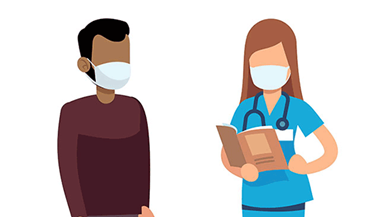Coronavirus and Domestic Violence: What You Should Know
Featured Expert:
冠状病毒大流行导致家庭伴侣和家人在家里度过了更多的时间. Not surprisingly, 长时间的近距离接触会导致更高的压力水平. 这引发了一个担忧:同一家庭的人是否更有可能互相恐吓或身体伤害?
Researcher Jackie Campbell of Johns Hopkins’ School of Nursing answers questions on spousal abuse and other domestic violence in light of COVID-19-related stress.
Is coronavirus causing more domestic violence?
我们没有太多证据表明,在2019冠状病毒病大流行期间,家庭暴力发生率正在上升. However, 有一点证据表明谋杀后自杀的比率, in which a male partner kills a female and then himself, has risen since the same time last year.
If domestic abuse is already a problem in a relationship, the coronavirus pandemic might be making it worse. 施虐者可能会利用这种情况对伴侣施加更多的控制.
是什么让身体虐待在冠状病毒期间更有风险?
即使居家令解除,一些地区重新开放, 由于大流行,压力源仍在增加. 学校仍然关闭,营地和活动被取消,所以孩子们呆在家里. 家庭可能会感到拥挤,因为他们无法逃离彼此而感到沮丧. At the same time, 他们与大家庭和朋友隔绝,不能再参加许多愉快和放松的活动.
There’s also the threat of COVID-19 itself. 人们害怕感染它,特别是如果他们是必不可少的工人,不能在家工作. 家庭可能有亲属感染COVID-19并需要住院治疗, but they can’t visit or provide support in person.
Financial stress can factor in, too, 特别是如果家里有人被解雇了.
随着这一切的发生,一些家庭可能会遇到更多的争吵. 目前尚不清楚在这种情况下家庭暴力是否会首次发生. 一个通常非暴力的人不太可能突然开始这样做. But, if a person has been abusive in the past, 他们可能会因为额外的压力而变得更加暴力.
PTSD: A Risk Factor in Domestic Abuse
One factor in domestic abuse stems from post-traumatic stress disorder, or PTSD. 患有创伤后应激障碍会增加成为施虐者和幸存者的风险.
People who witness abuse — for example, 那些在暴力家庭或社区长大的人——可能患有创伤后应激障碍. 参战老兵患创伤后应激障碍的风险很高,对家庭成员也有暴力倾向.
症状之一是过度警惕:患者描述自己感到紧张不安, with a tendency to overreact to a perceived threat. 一个令人痛苦的事件可以触发一个患有创伤后应激障碍的人,使他们感到受到身体攻击, with a necessity to fight back.
There's not always one, horrific event, such as combat experience or a car accident, which causes PTSD symptoms; a lifetime of exposure to violent behavior can add up. Structural racism is also a cumulative trauma, 如果这个人正在忍受微侵犯——有意或无意地表达对历史上被边缘化群体成员的偏见的微妙评论或行为——或者宏观侵犯, clear comments or actions of prejudice over time.
2019冠状病毒病期间饮酒:家庭暴力风险
如果家庭成员由于压力而比平时喝更多的酒, 他们可能会有更高的行为风险,对家庭成员造成身体伤害.
世界卫生组织指出,酒精与亲密伴侣之间的暴力有很强的相关性. 他们指出,酒精对身心都有影响,会损害思维和自我控制能力. 喝酒的人在不诉诸暴力的情况下处理关系冲突的能力可能更弱.
Webinar: The Emotional Toll of COVID-19
As part of A Woman's Journey webinar series, Johns Hopkins experts discuss PTSD, 冠状病毒大流行背景下的家庭暴力和自杀.
Look Out for Warning Signs
Put a plan together if someone you are living with is:
- being verbally or emotionally hurtful.
- threatening you.
- having episodes of explosive anger.
- harming animals.
Steps You Can Take to Keep Yourself and Others Safe
- Find a place you can retreat to safely. Avoid the bathroom or kitchen.
- 向你可以打电话的可信赖的朋友或家人寻求支持.
- 如果有必要,使用暗号或短语来表示你需要帮助.
- 记住在紧急情况下可能需要联系的人和机构的电话号码.
- Make sure you can easily access:
- cash.
- 身份证明(社保卡、驾照).
- birth and marriage certificates.
- credit cards, safe deposit box keys and bank information.
- health insurance information.
- 与以前的虐待事件有关的任何文件、照片、医疗或警察报告.
Are there apps or interventions for domestic abuse?
如果你感到不安全,但不确定与你住在一起的人是否在虐待你, 应用程序可以帮助你清楚地知道你是否有风险.
MyPlan 这款应用是否适用于任何在关系中遇到问题的人,无论是否与COVID-19有关. 这款应用可以帮助用户判断伴侣的行为是否有虐待的迹象. 此外,用户可以连接到个性化的资源,他们的情况和他们的生活优先事项.
In-person interventions can work, too. Strength at Home is a program offered by the U.S. 解决退伍军人对其家庭伴侣使用暴力的问题. 它是一种帮助解决虐待行为而不将施虐者妖魔化的方法. 随机对照试验表明,该方案是有效的.






